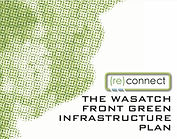(re)connect : The Wasatch Front Green Infrastructure Plan
In a two-year collaborative effort between communities, counties, and State and
Federal agencies, the Wasatch Front Regional Council partnered with the Center for
Green Infrastructure Design to develop a coordinated regional green infrastructure
plan. This Plan extends across five counties and sixty-three communities in one of the
fastest growing regions in the country. Local agencies and organizations have come
together in support of this project because they see a need within the Wasatch Front
to identify and conserve the region’s most valued, functional landscapes before they
disappear due to development pressures & irreparable alterations to landscape systems.
A region-wide comprehensive plan was needed to coordinate the various existing
Federal, State and local efforts to protect natural and social features. Green
infrastructure provides this planning approach and presents guides to setting priorities,
evaluating land-use alternatives, and optimizing mitigation programs & conservation
efforts, and presents a long-term environmental sustainable vision for the Wasatch Front.
This Plan provides a visionary, regional scale map of the region that reflects both
existing green infrastructure – forests, farmlands, streams, wetlands, trails – as well as
opportunities for expansion, restoration and connections. The Plan’s criteria-driven
methodology recommends that a high priority be given to identifying and preserving
important (high quality) but unprotected lands, especially those threatened by
development, and to protecting those areas, and specifically determined scales, that
can function and provide services through restoration and management.
The Plan, a strategic approach to preserving economic services through
conservation and land-use planning, clarifies the Region’s interconnected network
structure, function and value and is a decision support tool and land protection
strategy for agencies and organizations which can guide implementation efforts.
INTRODUCTION
EXECUTIVE SUMMARY
IMPLEMENTATION PLAN
























